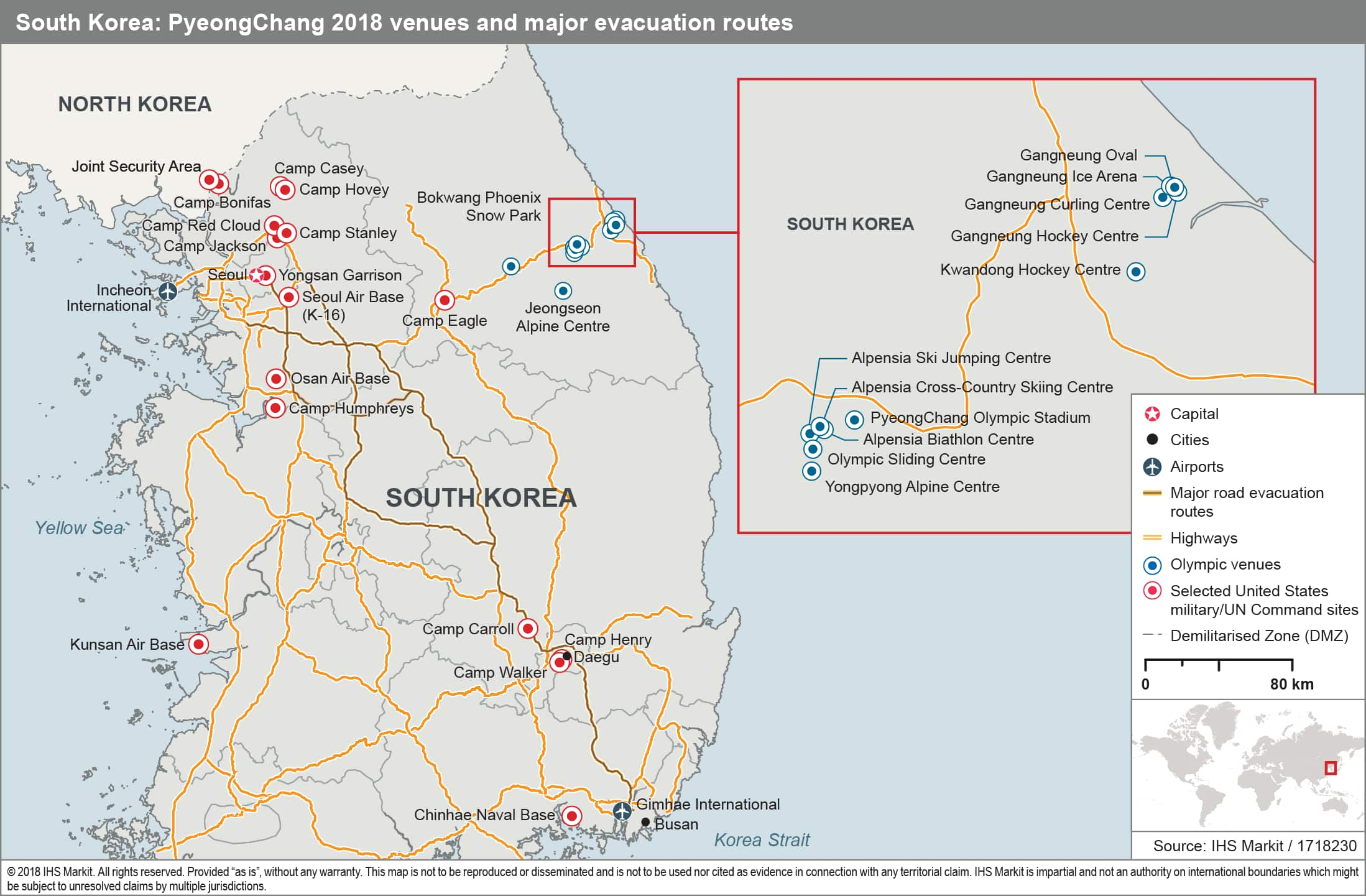Customer Logins
Obtain the data you need to make the most informed decisions by accessing our extensive portfolio of information, analytics, and expertise. Sign in to the product or service center of your choice.
Customer Logins
BLOG
Feb 06, 2018
South Korean Olympics
On 8 February 2018, North Korea will celebrate the 70th anniversary of the founding of its army with a military parade. Although military parades displaying North Korea's new weaponry are common, especially on decennial anniversaries, the upcoming parade is notable because it will probably display mock-ups of the Hwasong-15 intercontinental ballistic missile (ICBM) fired in November 2017 and it will be held the day before the PyeongChang 2018 Olympics and Paralympics begin in South Korea.
- South Korean President Moon Jae-in and US President Donald Trump's agreement on 4 January 2018 that US-South Korea joint military exercises would be delayed so as to not coincide with the Olympics and Paralympics was probably a North Korean precondition for ongoing talks between North Korea and South Korea. The talks that began on 9 January 2018 are important because they are a positive indicator for bilateral relations. North Korea ignored a similar request in July 2017. The talks will probably be used as an opportunity to discuss broader bilateral issues, including economic and security issues.
- The postponement of the US-South Korea joint military exercises until after the games and the attendance of a North Korean delegation would reduce the likelihood of North Korea taking deliberately provocative action, such as a further missile test, during the games. Although the likelihood of a provocative incident would be reduced, North Korean Supreme Leader Kim Jong Un's probable options would include a cyber-attack, an incursion over the maritime boundary, fire over the de facto land border, or a missile test. Specifically, a satellite imagery analysis by 38 North indicates that North Korea may well be preparing for an engine test or launch of its "Kwangmyeongseong" satellite, whose technology supports the development of longer-range missiles. North Korea routinely launches short- or medium-range missiles in response to US-South Korea military exercises, criticising them as training to attack North Korea.
- Apart from Kim's highlighting of his personal authority to launch North Korea's nuclear weapons, his New Year's address on 1 January 2018 did not indicate a substantial shift in policy relative to previous addresses that Kim has given since 2013. Building on statements in 2016 and 2017 highlighting North Korea's status as a "nuclear power" and its need to develop its "self-defence" capabilities to carry out pre-emptive strikes, Kim's 2018 address emphasised the readiness of North Korea's nuclear forces to deter or retaliate against any US first strike. In contrast to his offer of bilateral talks with South Korea, Kim showed no readiness to engage in talks with the United States on North Korea's nuclear weapon/missile programmes. This approach is probably an attempt to drive a wedge between South Korea and the United States, drawing on the allies' contrasting attitudes to dealing with North Korea.
- China is unlikely to support a full oil embargo on North Korea, although United Nations Security Council consensus will probably coalesce on sanctions that impose further restrictions on oil exports and on measures that reduce the illegal smuggling of commodities and weapons. China has not responded to the US's calls to halt crude oil shipments to North Korea, emphasising instead support for UN resolutions and the goal of denuclearising the Korean Peninsula. Deteriorating relations between China and North Korea since Kim succeeded in December 2011 have increased China's willingness to increase pressure on Kim and bring North Korea to the negotiating table. However, co-operation from China will most probably stop short of meeting US expectations.
- South Korean authorities in particular will probably step up their seizure and inspection of vessels, focusing on those either with Chinese or Russian flags or with predominantly Chinese crews. Specifically, authorities will probably target vessels suspected of ship-to-ship transfers, which are relatively difficult to eradicate because of the large number of North Korean "fishing" vessels around the Korean Peninsula and because of the ambiguity caused by foreign-flagged vessels turning off their transponders to stop transmitting location data. As the United States and its northeast Asian allies seek to improve sanctions enforcement and put pressure on North Korea to negotiate over its nuclear and missiles programmes, these enhanced security practices will probably disrupt maritime cargo around the Korean Peninsula. Beyond the six-month outlook, further sanctions focusing on the interdiction of cargo vessels are probable.

{"items" : [
{"name":"share","enabled":true,"desc":"<strong>Share</strong>","mobdesc":"Share","options":[ {"name":"facebook","url":"https://www.facebook.com/sharer.php?u=http%3a%2f%2fwww.spglobal.com%2fmarketintelligence%2fen%2fmi%2fresearch-analysis%2fSouth-Korean-Olympics.html","enabled":true},{"name":"twitter","url":"https://twitter.com/intent/tweet?url=http%3a%2f%2fwww.spglobal.com%2fmarketintelligence%2fen%2fmi%2fresearch-analysis%2fSouth-Korean-Olympics.html&text=South+Korean+Olympics","enabled":true},{"name":"linkedin","url":"https://www.linkedin.com/sharing/share-offsite/?url=http%3a%2f%2fwww.spglobal.com%2fmarketintelligence%2fen%2fmi%2fresearch-analysis%2fSouth-Korean-Olympics.html","enabled":true},{"name":"email","url":"?subject=South Korean Olympics&body=http%3a%2f%2fwww.spglobal.com%2fmarketintelligence%2fen%2fmi%2fresearch-analysis%2fSouth-Korean-Olympics.html","enabled":true},{"name":"whatsapp","url":"https://api.whatsapp.com/send?text=South+Korean+Olympics http%3a%2f%2fwww.spglobal.com%2fmarketintelligence%2fen%2fmi%2fresearch-analysis%2fSouth-Korean-Olympics.html","enabled":true}]}, {"name":"rtt","enabled":true,"mobdesc":"Top"}
]}



